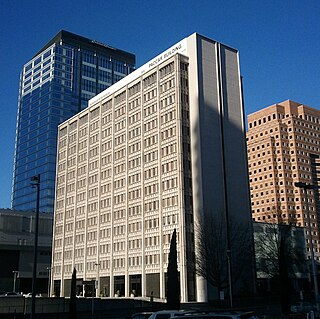
Paccar Inc is an American company primarily focused on the design and manufacturing of large commercial trucks through its subsidiaries DAF, Kenworth and Peterbilt sold across markets worldwide. The company is headquartered in Bellevue, Washington, in the Seattle metropolitan area, and was founded in 1971 as the successor to the Pacific Car and Foundry Company, from which it draws its name. The company traces its predecessors to the Seattle Car Manufacturing Company formed in 1905. In addition to its principal business, the company also has a parts division, a financial services segment, and manufactures and markets industrial winches. The company's stock is a component of the Nasdaq-100 and S&P 500 stock market indices.

Kenworth Truck Company is an American truck manufacturer. Founded in 1923 as the successor to Gersix Motor Company, Kenworth specializes in production of heavy-duty and medium-duty commercial vehicles. Headquartered in the Seattle suburb of Kirkland, Washington, Kenworth has been a wholly owned subsidiary of PACCAR since 1945, operating alongside sister company Peterbilt Motors.
The Wayne Corporation was an American manufacturer of buses and other vehicles under the "Wayne" marque. The corporate headquarters were in Richmond, Indiana, in Wayne County, Indiana. During the middle 20th century, Wayne served as a leading producer of school buses in North America.

ACF Industries, originally the American Car and Foundry Company, is an American manufacturer of railroad rolling stock. One of its subsidiaries was once (1925–54) a manufacturer of motor coaches and trolley coaches under the brand names of (first) ACF and (later) ACF-Brill. Today, the company is known as ACF Industries LLC and is based in St. Charles, Missouri. It is owned by investor Carl Icahn.
The St. Louis Car Company was a major United States manufacturer of railroad passenger cars, streetcars, interurbans, trolleybuses and locomotives that existed from 1887 to 1974, based in St. Louis, Missouri.

The J. G. Brill Company manufactured streetcars, interurban coaches, motor buses, trolleybuses and railroad cars in the United States for nearly 90 years, hence the longest-lasting trolley and interurban manufacturer. At its height, Brill was the largest manufacturer of streetcars and interurban cars in the US and produced more streetcars, interurbans and gas-electric cars than any other manufacturer, building more than 45,000 streetcars alone.

Canadian Car and Foundry (CC&F), also variously known as "Canadian Car & Foundry" or more familiarly as "Can Car", was a manufacturer of buses, railway rolling stock, forestry equipment, and later aircraft for the Canadian market. CC&F history goes back to 1897, but the main company was established in 1909 from an amalgamation of several companies and later became part of Hawker Siddeley Canada through the purchase by A.V. Roe Canada in 1957. Today the remaining factories are part of Alstom after its acquisition of Bombardier Transportation completed in 2021.
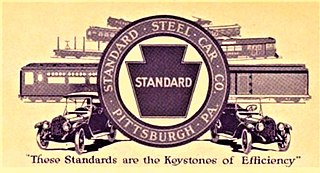
The Standard Steel Car Company (SSC) was a manufacturer of railroad rolling stock in the United States that existed between 1902 and 1934.
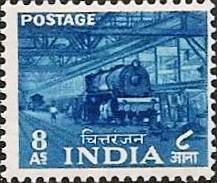
Chittaranjan Locomotive Works (CLW) is an electric locomotive manufacturer based in India. The works are located at Chittaranjan in the Asansol Sadar subdivision of West Bengal, with an ancillary unit in Dankuni. The main unit is 32 km from Asansol and 237 km from Kolkata. CLW has stores and offices in Kolkata, as well as inspection cells in New Delhi, Mumbai, Kolkata, and Bangalore. It is the largest locomotive manufacturer unit in the world, producing 431 locomotives in 2019–20.
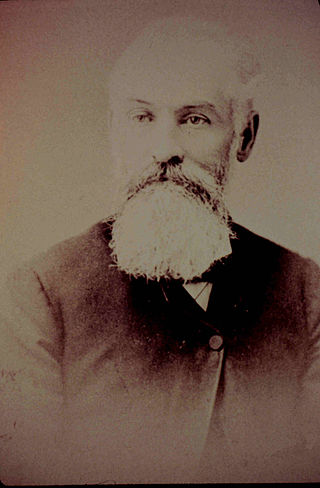
The Cobourg Car Works, also known as the Crossen Car Works, was an early railway car and streetcar builder based in Cobourg, Ontario. The company was split off from the Ontario Foundry in 1873 by James Crossen Jr., the foundry's owner. When James died in 1890, control of the company passed to his children, who renamed it as the Crossen Car Manufacturing Company. Supplying almost all of the major Canadian railways, as well as many local regional lines, the Crossen works became the largest car company in Canada. The move to all-steel constructed and CPR's decision to open their own works led to a rapid downturn in business, and the company closed in 1913.

General Steel Industries, Inc. (GSI) was an American steel company founded as General Steel Castings Corporation in 1928. The company's first headquarters were in Eddystone, Pennsylvania and, prior to completing its own modern steel foundry in 1930, acquired the operations of the Commonwealth Steel Company, a critical supplier to the rail industry.

MÁVAG was the largest Hungarian rail vehicle producer. MÁVAG company was the second largest industrial enterprise after the Manfréd Weiss Steel and Metal Works in the Hungarian half of the Austro-Hungarian Monarchy. MÁVAG was the property of the Kingdom of Hungary. After World War II MÁVAG was nationalized, and "Királyi" ("Royal") was removed from its name.
Ensign Manufacturing Company, founded as Ensign Car Works in 1872, was a railroad car manufacturing company based in Huntington, West Virginia. In the 1880s and 1890s Ensign's production of wood freight cars made the company one of the three largest sawmill operators in Cabell County. In 1899, Ensign and twelve other companies were merged to form American Car and Foundry Company.
Jackson & Woodin Manufacturing Company, also called Jackson & Woodin Car Works, was an American railroad freight car manufacturing company of the late 19th century headquartered in Berwick, Pennsylvania. In 1899, Jackson and Woodin was merged with twelve other freight car manufacturing companies to form American Car & Foundry Company. Jackson and Woodin's management were proponents of the temperance movement in America, and went as far as buying all the saloons and hotels in Berwick, leading to Berwick becoming a dry town by 1881. By the time of the 1899 merger that created American Car and Foundry Company (ACF), Jackson & Woodin was the largest freight car manufacturer in the eastern United States. The Jackson & Woodin shops became ACF's Berwick Plant, a plant that was heavily used by ACF.
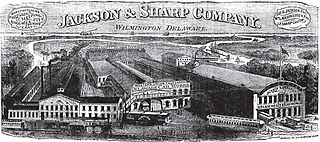
Jackson and Sharp Company was an American railroad car manufacturer and shipbuilder in the late 19th and early 20th centuries. The company was founded in 1863 by Job H. Jackson, a tinsmith and retail merchant, and Jacob F. Sharp, a carpenter who had worked for rail car manufacturers and shipbuilders.

Gilbert Car Company was a railroad car builder based in Troy, New York. It began manufacturing streetcars in the late 1880s. Gilbert cars were sold and exported worldwide.

The RÁBA Automotive Group, commonly known as Rába, is a Hungarian public limited company, listed on the Budapest Stock Exchange. Rába engineers, manufactures and customizes automotive components, specialty vehicles and axles for commercial vehicles, agri-machinery and earth-movers. The Rába has been building axles as well as complete vehicles since 1902. The company has three strategic business units. The company is headquartered in Győr, employing more than 2000 people.

National Steel Car is the largest manufacturer of railway rolling stock in Canada, based in Hamilton, Ontario. The company was founded in 1912, and has been a top 3 rolling stock manufacturer in Canada for its lifetime. National Steel Car is a subsidiary of National Industries Inc. and is currently led by Greg Aziz, chairman and CEO of National Steel Car.
Karl Fritjof Nystrom was an American rail engineer who introduced a number of important innovations, including welded lightweight freight and passenger railcars. He is probably best known for his work designing and building the Hiawatha trains for the Milwaukee Road.















